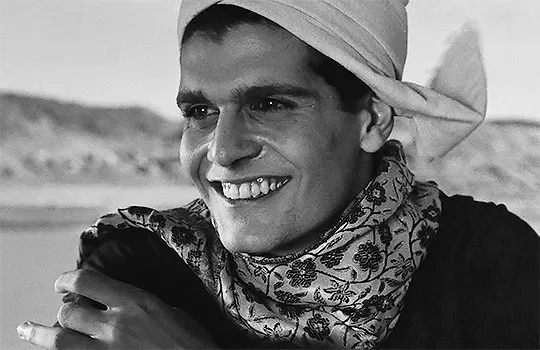 |
| Nour El-Sherif and Mohamed Mounir in An Egyptian Story |
Cast: Nour El-Sherif, Oussama Nadir, Mohsen Mohieddin, Yousra, Ahmed Mehrez, Mohamed Mounir, Ragaa Hussein, Seif Abdelrahman, Hanan, Layla Hamadah, Magda El-Khatib, Ragaa Al-Gidawy. Screenplay: Youssef Chahine. Cinematograpby: Mohsen Nasr. Art direction: Gabriel Karraze. Film editing: Rashida Abdel Salam. Music: Gamal Salamah.
An Egyptian Story is the middle film of Youssef Chahine's autobiographical "Alexandria trilogy," and it may be the most accessible to people not familiar with his work. Perhaps inspired by Bob Fosse's All That Jazz (1979), it centers on the memories and fantasies of a film director, Yehia Choukry Mourad (Nour El-Sherif), who is Chahine's alter ego, as he undergoes open heart surgery. Some of the action takes place in a set designed to resemble Yehia's chest cavity, where a trial takes place. The defendant is Yehia's "inner child," played by young Oussama Nadir, who is on trial for killing the mature Yehia -- though he isn't really dead yet. Key events of Yehia's life take place in flashbacks that are sometimes realistic, sometimes surreal. In the first film of the trilogy, Alexandria ... Why? (1979), Yehia was played by Mohsen Mohieddin, who appears in this film as Yehia as a young man. In the third film, Alexandria Again and Forever (1990), Chahine himself takes the role as the aging Yehia. Because of the trial setting, the narrative of An Egyptian Story is more linear than the first and third stories in the trilogy, and might be the one to watch if you're just getting started with Chahine's work or if, like me, you're not well versed in the history of Egypt in the 20th century that serves as the backdrop of Yehia's story. Chahine doesn't spare himself in any of the films, revealing much about his ego and ambition, his neglect of his family, and even hinting rather broadly at his bisexuality. Those more familiar with his work may find An Egyptian Story a little less colorful and creative than the others, but it's still a remarkable movie.

















